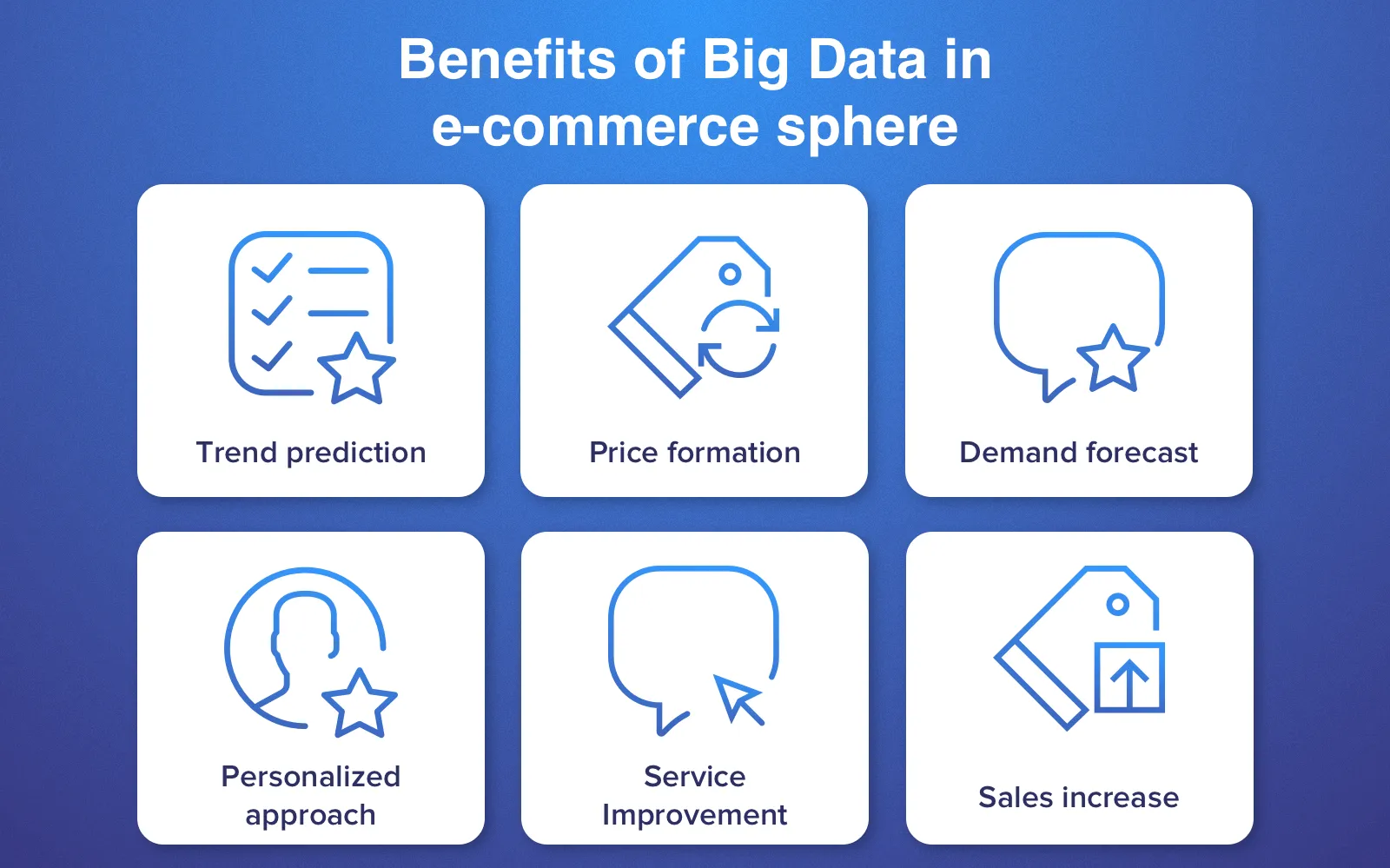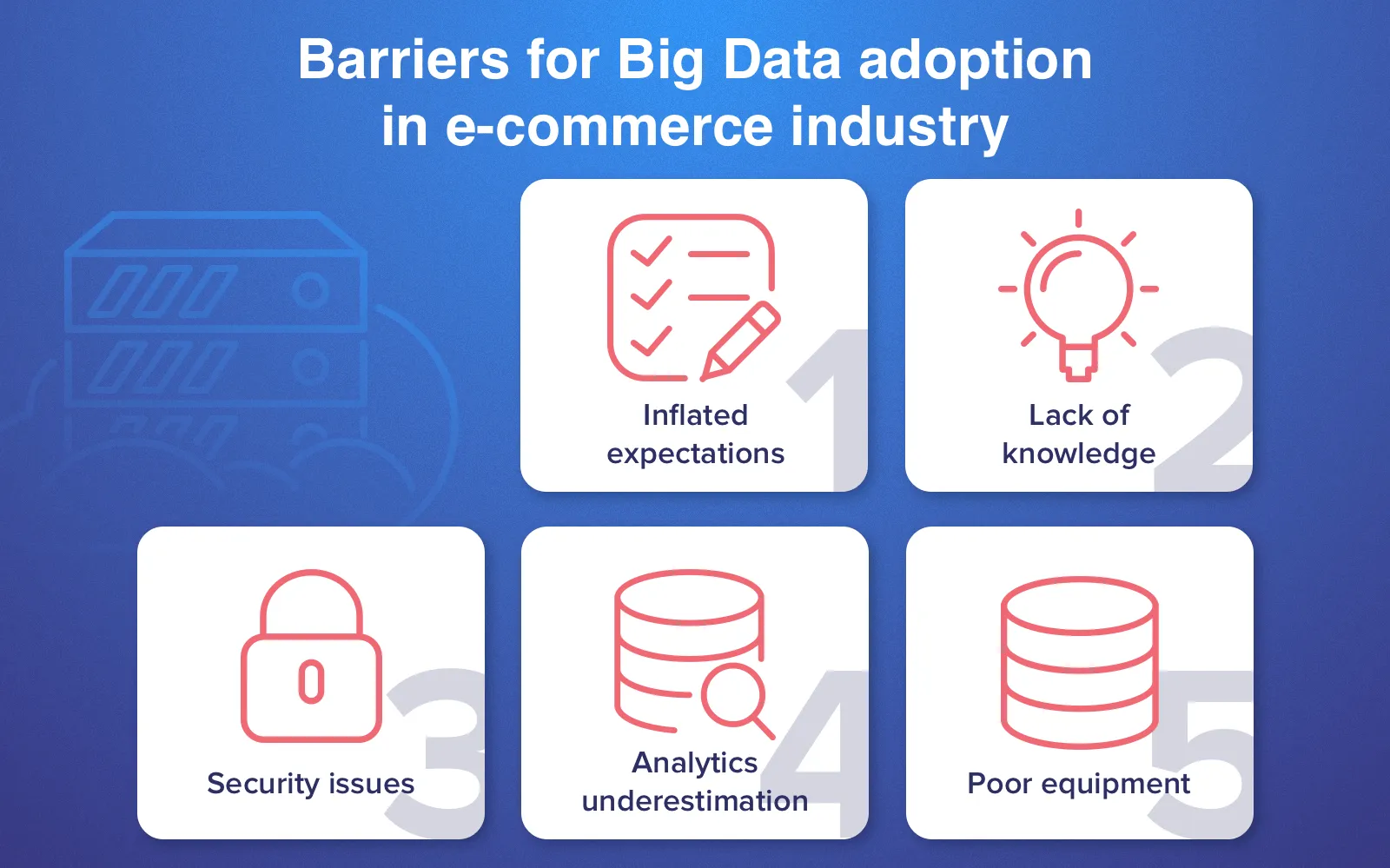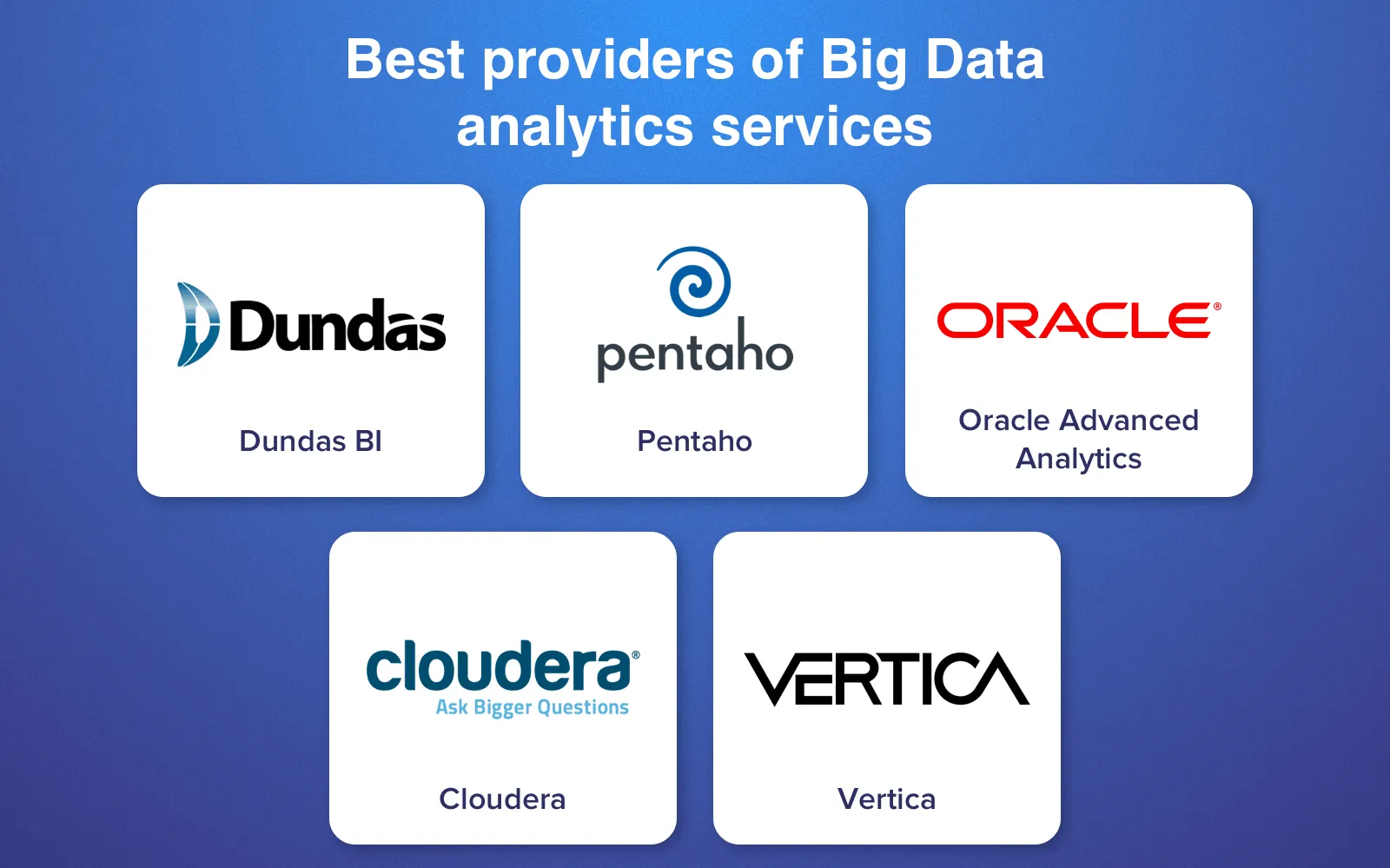6 Solid Proofs to Apply Big Data E-commerce System to Your Retail Business
Updated 20 Mar 2023
11 Min
3283 Views
E-commerce grows. It grows rapidly creating tonnes of data. Without processing this data is useless. But after you've tamed it, you get priceless insights and understanding of all processes in the e-commerce sphere. Big Data is a valuable instrument which solves multiple problems of the industry and brings various advantages. But are there any drawbacks? What is the role of Big Data in e-commerce? And who is the best Big Data analytics vendor? Let's find out!
Use of Big Data in e-commerce to solve common problems
Over the last 4 years, revenue from the goods sold via the Internet has doubled. Compare, there were more than 300 million active users on Amazon in 2015. And 183 million people visited Amazon in September 2017 only! 87 million people visited Wal-Mart and 86 million people visited eBay during the same period in 2017. In the third quarter of 2017 PayPal, one of the most trusted online payment gateways, calculated 200 million registered active users in total worldwide.
All these users create tons of information. More users - more data. And here you need to make a choice, either you ignore it and use a blind trial-and-error method or, you use all the information to advance your business approach. It's up to you. But if you choose the second option you have a chance to solve a range of problems connected with the e-Commerce sphere. Here are the advantages of Big Data in e-commerce sphere:

Common problems Big Data solves in e-commerce sphere
Trend prediction
Special forecasting systems based on Big Data algorithms pull data from all known social media and browsers and defines the biggest trends and hypes. This is how to turn Big Data in to e-commerce. It is always easy to foresee the tendencies and preferences of the society. The other option is to track ad data. While monitoring marketing companies and departments you can get the information about the trends which are only forming. As well as that, the Big Data e-commerce system processes requests in browsers analysing whether they are positive or negative concerning each particular product. All these insights are needed to build better business strategy.
Price formation
As a businessman you know that the retail margin forms your revenue, still, if you make it too high, people will approach your competitors. That is why the issue of price formation is so crucial. E-commerce Big Data tools collect and compare prices of one product all over the Internet. The platforms pull such data as prices of your competitors, cost of a product, it's popularity, unit sales data and many others. It also follows the demand for a product and can suggest you an optimal price in a real-time mode.
Find out what you've missed creating your retail website. All the best practices from the most successful e-commerce sites are in our short video!
5 Tricks from Successful Ecommerce Sites
Demand forecast
Have you ever calculated what is the average time a product is kept in a warehouse before it is bought? Have you ever calculated how much you pay for this time? Storage expenses can kill your business. Such events like holidays, football matches and festivals can bring you lots of money. And e-commerce application on Big Data takes all these factors into account to provide you with the freshest information about the demand forecast. Thus, you'll be able to get the products and their precise number to sell in a particular period of time.
Personalized approach
To understand how Big Data enables personalization in e-commerce, we need to learn how browsers work. Modern browsers 'memorize' all your requests and preferences, store this information and offer you the goods you may need. You should do the same! Your online shop can track the preferences of visitors and fill a store with relevant products. In such a way, you increase revenue and a customer buys more because he or she sees more goods which they can potentially buy (based on the history of reviews). If you add a feature of personalized suggestions, your customers would appreciate it very much (and reward you with more purchases).
Find out why a website isn't enough anymore and how to create an appealing app for the retail business!
Service Improvement
There so many rivalries on the market that you need to be the fastest, the most pleasing and polite. Otherwise, you lose a client. Did you know that almost 90% of customers deny dealing with a company after they faced poor services? A half of all customers leave a transaction if their requests aren't processed quickly enough. Companies use Big Data in e-commerce to collect the information about customers from their social pages and browser history. By doing this, you can offer absolutely new, personalized, improved services to your clients.
Sales increase
Business has to grow. You need to increase sales all the time. Big Data can help you here too. For instance, Big Data can solve the issue of shopping cart abandonment. It was estimated that almost 70% of all shopping carts are abandoned before a purchase. It happens due to multiple reasons and Big data analytics should reveal them.
Big Data in e-commerce adoption barriers
It all sounds very optimistic. Still, don't think that Big Data is a magic wand. It needs more time to become absolutely perfect. Now, it has a range of barriers you can stumble over. Make sure you know how to deal with them before you start using Big Data analytics in e-commerce. Here is the list of the most significant threads the Big Data approach has today.

Threats of Big Data adoption to e-commerce sphere
Inflated expectations
The first issue connected with Big Data adoption is not a technical problem but the mental one. The system will not solve all the issues in your company. It only gives you the information. You should use it wisely.
Lack of knowledge
You will have to learn how to work with Big Data apps and information it gives to you. First of all, you need to learn how to ask right questions. Second of all, you will have to process the data from BD analysis. The machine does not define variables, they are all the same for it. And in some cases, the results you get would look like delirium. For instance, an analysis showed that the sales of tomatoes were higher in a period when a Donati's comet was passing by the Earth. It does not mean that the next time this comet comes close, you should stock up on tomatoes.
Thinking about a carrier of a developer but can't choose the technology to learn? Here's the list of the most attractive programming languages in 2024!
Security issues
Probably the biggest barrier to Big Data adoption. Since Big Data knows everything about everyone, it's a huge threat to all people who use the Internet. Tonnes of personal data, credentials, private information high-profile information can be used against these customers. When you decide to adopt the approach, the first thing you need to think about is how to protect your users and their information.
Analytics underestimation
Lots of entrepreneurs who tried to adopt Big Data approach believed that data collection is the most important stage. They were wrong. The most important is the results you get after all that gathered data was processed. That is why you have to invest in analytics tools more than in gathering ones.
Poor equipment
It concerns both hardware and software systems. Such a huge amount of information should be stored somewhere and processed somehow. And all there processes require large capabilities. Fortunately, modern Big Data analysis vendors offer a wide range of services including data gathering, storing, processing and analysis.
The system is complex and requires a specific skill set for a setup and customization. If you don't have any technical background, you should find a company providing development services which will do the job. Still, work with analytical data is only on you. All the issues are minor if you are ready to work hard and achieve some great results. We believe that Big Data can bring more benefits if you adopt it wisely with no rush. Another key to the success of Big Data approach adoption is a vendor. Let us walk you through it and compare the best modern providers of Big Data analytics tools.
Big Data e-commerce software solutions
When you are choosing a tool or a system for your company make sure you know how to work with it. Some systems were designed for novices and some for professionals. Some platforms offer both solutions. Let's look closer at these systems to understand what they are capable of.

The best providers of Big Data analytical systems for e-commerce sphere
Dundas BI
Dundas BI is a company which offers you a web-based dashboard for e-commerce Big Data analytics. The dashboard is 100% customizable. Here you choose tools you need, build your own reports and process as many metrics as you need. The tool can be linked or integrated with other instruments. It can be hosted in a cloud environment or locally. It's a great tool with very flexible pricing system which also provides it's API for developers.
Pentaho
Pentaho is a professional e-commerce Big Data platform which provides BD analytics, visualization, reporting data mining and predictive analytics in one fully-customizable dashboard. This tool is compatible with multiple databases, Hadoop platform and NoSQL. The system covers different data layers from various resources and processes it into a visual analysis. The great advantage is that the company gives you a free trial period which can help understand whether you need it or not.
Want to develop an ecommerce app? Read more about how to create app for ecommerce
Oracle Advanced Analytics
Oracle company offers multiple systems and platforms for data analytics. The main platform includes two products Oracle R Enterprise and Oracle Data Mining and works with Oracle Databases. All together it's a complex platform for real-time analytics with such great features as market predictions, goods recommendations and even fraud allegations. What is more, Oracle offers numerous tools for developers which allows you to extend the functionality of a product. There are many more Oracle Big Data solutions which you can use out-of-the-box. Still, it's better to hire a professional in web and mobile app development services who will customize the system according to your needs.
Cloudera
Cloudera is a more complicated system which requires some development skills to work with. It works with the Hadoop platform, an open-source framework for data processing tasks. Cloudera is an open source system with a licence from Apache Corporation, which means it's very easy to work with for an experienced developer. The company assures us that the system is easy to scale, highly-secured and very powerful for your Big Data projects.
Still can't find the best mobile analytics tool for your app? Check our article and choose one to fit all your criteria!
Vertica
Vertica is an analytics platform built specifically for the application of Big Data in e-commerce. The platform is very popular because it works very fast, It's simple, open and scalable. Vertica company offers three main products. The first one, Vertica Enterprise is an analytical database with fast loading and querying characteristics, advanced in-database analytics, and numerous administration and management tools. Vertica in the cloud is a cloud analytics platform which you can run on Microsoft Azure, Amazon Web Services and VMware clouds. This system offers you the high-performance information analytics of an enterprise-class. It has all the most required and useful features to process a huge amount of data. As well as that, Vertica also has a solution for SQL on Hadoop. It also offers a free trial period, so you can try before you pay.
Big Data in e-commerce industry is an approach to use a resource which we've ignored for many years. It is a powerful tool to see the overall picture, understand cause-and-effect relationships, foresee and predict trends and, of course, use all that to maximize revenue. The approach has some drawbacks and minor barriers to adoption, still, it can bring any retailer more benefits than harm if he or she understands the peculiarities of the process. The tool you'd like to use should be chosen according to the needs and knowledge of your enterprise. And if you need any help with it's integration, contact us to get the highest quality assistance.
Big data in e-commerce has many use cases. Here are some that impact businesses the most:
- Trend prediction
- Price formation
- Demand forecast
- Personalized approach
- Service improvement
- Sales increase
Simply put, big data in e-commerce is a method of analyzing and taking advantage of large data arrays gained from user actions on the e-commerce platform and third-party resources.
Big data is a necessary tool for e-commerce platforms because of the opportunities it provides to businesses. Big data can help entrepreneurs to predict trends and increase sales. It's hard to ignore these benefits.
To understand how Big Data enables personalization in e-commerce, we need to learn how browsers work. Modern browsers 'memorize' all your requests and preferences, store this information and offer you the goods you may need. You should do the same! Your online shop can track the preferences of visitors and fill a store with relevant products. In such a way, you increase revenue and a customer buys more because he or she sees more goods which they can potentially buy (based on the history of reviews). If you add a feature of personalized suggestions, your customers would appreciate it very much (and reward you with more purchases).
There so many rivalries on the market that you need to be the fastest, the most pleasing and polite. Otherwise, you lose a client. Did you know that almost 90% of customers deny dealing with a company after they faced poor services? A half of all customers leave a transaction if their requests aren't processed quickly enough. Companies use Big Data in e-commerce to collect the information about customers from their social pages and browser history. By doing this, you can offer absolutely new, personalized, improved services to your clients.
Customer experience improvement and revenue increase are the most popular big data use cases in e-commerce.

Evgeniy Altynpara is a CTO and member of the Forbes Councils’ community of tech professionals. He is an expert in software development and technological entrepreneurship and has 10+years of experience in digital transformation consulting in Healthcare, FinTech, Supply Chain and Logistics
Give us your impressions about this article
Give us your impressions about this article